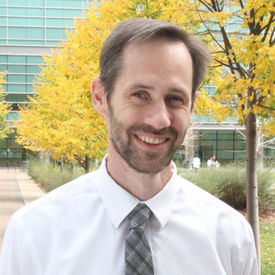What led to your research focusing on early detection of dementia and Alzheimer’s?
Pressman: The big picture from the neurodegenerative perspective is that early detection matters. With what I would call “diagnostic nihilism,” a lot of people don't seem to care if you detect Alzheimer's early or not because their thought is, "Well, what are you going to do about it?"
The other difficulty is that the tools that we have used to detect cognitive changes are fairly blunt and can’t detect very early. The pathological changes associated with Alzheimer's are in the brain evolving probably a decade or more before people ever describe having cognitive symptoms. Added to that is most of these folks are seen by primary care providers who are infamously time stretched in the medical environment today.
This is why early detection matters. And although there is no cure, there are still ways that we can be hopeful. Even with the limited therapies and guidance that we can provide now, we are able to add life to years. Then hopefully with more research, add years to life.
I would argue that what is needed is something quick, reasonably accurate, easily implemented and cheap. Speech happens to touch on all of those things. You're talking to your doctor already. If there's a way that we can analyze changes in that speech as part of your conversation to detect brain changes, then we may have a very effective screening tool. So where that technology lies now is at an interesting point.
Foltz: Also, our view is that language is a window into cognitive and mental processing. If we can analyze that language, we can have a view into what's happening in terms of neurological processing. Essentially, that's what clinicians are doing when they're having a conversation or when they're administering certain kinds of assessments to a patient: They are listening to that language and assessing it. The question is, can we apply natural language processing and machine learning in order to be able to support and augment the clinician’s judgments of some of those language components from patients?
Where did this field of study begin, and how does your current work intersect with existing research?
Foltz: At a conference, I presented a paper on language coherence and a researcher from the National Institute of Mental Health came up and said, "Hey, have you ever thought of applying this to schizophrenia?"
We set up a long-term collaboration where we designed new tasks and collected data and could apply this technology and assess it. One of the early results showed that we could diagnose the severity of schizophrenia as accurately as clinicians from transcripts of interviews. When that initially came out in the early 2000s, it was very difficult to publish it. Nobody would believe that you could use AI to do that. Now, however, there are many more people working on it, so it's much more regarded. So we've been working and trying to perfect a lot of these techniques over the years and improve on them.
Pressman: Also, some of the earliest work on this comes from a study of nuns from the mid-1990s. The investigators looked at a measure called “idea density,” meaning roughly how many ideas are expressed within a certain segment of speech. In this case, it was actually writing. They were able to look at the journal entries by nuns when they entered the convent; then they got older, and then some of them would get dementia and some would not. You could look back at those early journal entries and predict who was going to get dementia decades later by the style of their writing.
Other studies have looked at major figures and looked at spontaneous speech. Studies of President Reagan, for example, looked at non-scripted parts of his speeches and how those changed during the time he was in office: a decrease in his “unique word count” – the richness of vocabulary. Alongside a rise in nonspecific nouns – “thing,” “element,” “whatnot” – the things you say when you can't quite come up with the right words, so you put something in.
There have been other studies that point to neurodegeneration. These look at things such as the rate of people’s speech – all of us adjust our speaking rate to match that of our conversational partner – and conversational laughter. Taking these separate studies in succession, we start to collect instances of "Hey, look, it's another speech measure that seems to predict a particular type of underlying neurodegeneration” and investigate if they have diagnostic value.
So in building from these studies, how are you designing a system to identify dementia?
Foltz: Essentially, what we do is collect language, inputting a large number of different features – how quickly someone is speaking, pronunciation, how sentences are put together and relate to the next sentence on the same topic. All of those things can be indicators. So we can build different kinds of computational features that can analyze language that way. That’s called “natural language processing.”
Then we do machine learning: collecting data from a large number of patients and controls and having them all do a similar task. We can then use the computer to try to discern what are some of the features that are more associated with those diagnostic categories and what are features that are not.
There are a lot of variables, but there are also some commonalities that you see in language, particularly with certain kinds of disorders. For example, in depression, people with flat affect: There tends to be less change in their intonation and their tonality. Similarly, with certain forms of schizophrenia, you'll see looser associations between words. The idea is, can we design AI that can discern those, but it’s not affected by some of the other differences, such as vocabulary differences or someone who speaks multiple languages.
This builds a system that says, “I want to look for these particular kinds of features and these kinds of patterns and use that to then put out a prediction that identifies Alzheimer's disease or mild cognitive impairment.”
How does AB Nexus help with your research?
Foltz: From my perspective, this provides a platform for a kind of work that’s hard to try and do otherwise. The whole part of the “Nexus” part of AB Nexus is finding these things where you can say, "We could not do this project unless we have both the medical knowledge and medical access, as well as the computational and assessment side of the work." So it all needs to go together.
We also don't believe that the AI is there to be the diagnoser. It's there to be an aid for the clinician. I think this is really important – that it should be looked at as a tool and not a replacement for anything that's currently being done. It's more of a way to allow more data that could be very useful.
Pressman: Furthermore, if you are ever going to truly adopt this in a medical environment, doctors are going to want to be able to really understand the results and to be able to convey them to patients at a level beyond “the computer says so.” So the goal of the AB Nexus Grant is to improve the transparency and trustworthiness of these tools as well.
We also have a specific aim of community engagement. With doctors and other medical providers, we want to learn: “What would you want to know if you were to use this tool and how would you be comfortable with it? Would you ever be?”
At the same time, we're also meeting with as many different community stakeholders as possible to make them aware of some of the challenges that are coming in the health field with this kind of technology. Then we’re soliciting their feedback so we can learn how to do this better.
It also ties into the work that we’re doing in trying to approach other facets of transparency – more technical aspects, like making sure we're identifying changes of speech over time, which I think are more honed to that individual rather than broad community cross sections.







